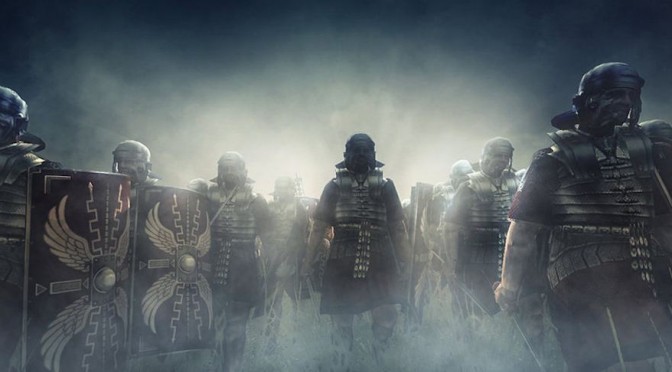Saturnius
 Like Tiberius, Domitian concentrated his efforts along the Danube not in Gaul. In 89 Saturnius , governor of Germania superior, rebelled against Domitian. The two legions which supported him had many Celts amongst their numbers and was supported by the Chatti, supposedly defeated by Domitian in his earlier campaign. Saturnius based himself at Castrum Mogontiacum (Mainz). The city was dedicated to the Celtic god Mogons,( the great one) Mainz was founded by Drusus and a monument to his memory erected by his legions had become a place of pilgramage for Gauls.
Like Tiberius, Domitian concentrated his efforts along the Danube not in Gaul. In 89 Saturnius , governor of Germania superior, rebelled against Domitian. The two legions which supported him had many Celts amongst their numbers and was supported by the Chatti, supposedly defeated by Domitian in his earlier campaign. Saturnius based himself at Castrum Mogontiacum (Mainz). The city was dedicated to the Celtic god Mogons,( the great one) Mainz was founded by Drusus and a monument to his memory erected by his legions had become a place of pilgramage for Gauls.
Conspiracy?
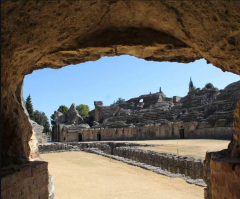 The rebellion was defeated by Domitian’s general Trajan. Trajan had been born in Hispania and had served with the legions in Spain and so had a higher profile amongst the Celts than did Domitian. Trajan destroyed all Saturnius’ correspondence leaving a possibility the the revolt was in support of Agricola and that Trajan had in some way been involved himself involved. Domitian was murdered.
The rebellion was defeated by Domitian’s general Trajan. Trajan had been born in Hispania and had served with the legions in Spain and so had a higher profile amongst the Celts than did Domitian. Trajan destroyed all Saturnius’ correspondence leaving a possibility the the revolt was in support of Agricola and that Trajan had in some way been involved himself involved. Domitian was murdered.
Trajan
 On the death of both Agricola and Domitian the senate chose an elderly Nerva as emporer, who promptly nominated Trajan as his heir. Trajan may well have been a celtic nominee . He campaigned in Dacia And Parthia but during his reign there were no disturbances in Gaul. The senate regarded Trajan’s rule as the high point of the Roman Empire. He died of a stroke on his way back to Rome after a historic victory against the Parthians
On the death of both Agricola and Domitian the senate chose an elderly Nerva as emporer, who promptly nominated Trajan as his heir. Trajan may well have been a celtic nominee . He campaigned in Dacia And Parthia but during his reign there were no disturbances in Gaul. The senate regarded Trajan’s rule as the high point of the Roman Empire. He died of a stroke on his way back to Rome after a historic victory against the Parthians
Hadrian
 In 117 Hadrian, Trajan’s second cousin. also from Hispania was appointed as his heir. He also concentrated his efforts on the eastern part of the empire .
In 117 Hadrian, Trajan’s second cousin. also from Hispania was appointed as his heir. He also concentrated his efforts on the eastern part of the empire .
The Celts had been given little attention and in consequence there was a widespread rebellion in Britain in 119-121 during which there were many Roman casualties and the ninth Legion Hispania “disappeared”. Hadrian visited Britain either during or shortly after these disturbances. However he did not spend very long in Britain. His actions in Judea may well have incited the Bar Kokhba revolt(by banning circumcision) The war lasted from AD132 to 136, and cost the Romans heavy losses. It is possible that the ninth legion survived the british rebellion only to be destroyed in Judea.
High King or God?
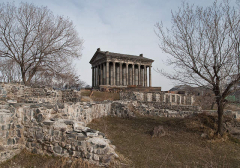 The Trajan /Hadrian family provided four more Emporers, from Antonius Pius in 138 to Commodus who reigned until 192 . In the west these appeared to be relatively uneventful years but were occupied with a gradual shift of power away from the senate to the emperors and the emperors representatives. In the west the emperors representatives were often Celtic .
The Trajan /Hadrian family provided four more Emporers, from Antonius Pius in 138 to Commodus who reigned until 192 . In the west these appeared to be relatively uneventful years but were occupied with a gradual shift of power away from the senate to the emperors and the emperors representatives. In the west the emperors representatives were often Celtic .
This period gives us a snapshot of the difference between the Celtic west and the Hellenic east. The Celts wanted a person to perform the role of High king, a person who was prepared to prove that they were worthy of the role. In the East they emphatically did not want a person, they wanted the emperor to be a god..
Antonius
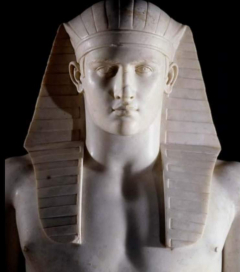 In the West there were stirrings of displeasure if the Emperor did not come amongst them but in the east a visit from an Emperor revealing human frailty rather than divine invincibility actually caused difficulties.
In the West there were stirrings of displeasure if the Emperor did not come amongst them but in the east a visit from an Emperor revealing human frailty rather than divine invincibility actually caused difficulties.
Hadrian found a unique solution he declared his lover Antonius a god. Antonius drowned in the Nile and was then depicted throughout the empire in statues which emphasised his beauty. The worship of this Antonius lasted for hundreds of years
Marcus Aurealis
.
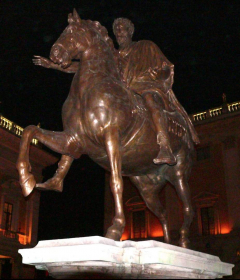 Marcus Aurelius was from Cordoba in Hispania. The joint Emperorship between Marcus Aurelius and Lucius Verus was the first time such an arrangement had been made and the two emperors informally arranged that Marcus would take responsibility for the Western Empire and Lucius, for the eastern empire. More importantly they made the arrangement work supporting each other where necessary
Marcus Aurelius was from Cordoba in Hispania. The joint Emperorship between Marcus Aurelius and Lucius Verus was the first time such an arrangement had been made and the two emperors informally arranged that Marcus would take responsibility for the Western Empire and Lucius, for the eastern empire. More importantly they made the arrangement work supporting each other where necessary
The Zenith
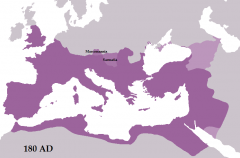 The total empire was slightly bigger at the end of the joint reign than at any other period. The period was marked by the priority given to war with the Parthians. There were also minor adjustments on the Danube border. Few resources were given to the West. In consequence despite the total empire reaching its geographical zenith, it was far from stable.
The total empire was slightly bigger at the end of the joint reign than at any other period. The period was marked by the priority given to war with the Parthians. There were also minor adjustments on the Danube border. Few resources were given to the West. In consequence despite the total empire reaching its geographical zenith, it was far from stable.
Comes Augustus
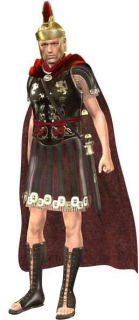 In the middle of this period is one of the few definitive identifications of the appointment of a Comes as the emperors representative. Marcus Aurelius forced his co emporer Lucius Verus to marry Marcus’ daughter Lucilla . Lucius was known to be dissolute perhaps depraved, therefore Marcus made his daughter’s safety the responsibility of Civica Barbarus, the half brother of Lucius’ father . He appointed Civica “Comes Augusti” a good illustrations how varied the appointment of Comes could be.
In the middle of this period is one of the few definitive identifications of the appointment of a Comes as the emperors representative. Marcus Aurelius forced his co emporer Lucius Verus to marry Marcus’ daughter Lucilla . Lucius was known to be dissolute perhaps depraved, therefore Marcus made his daughter’s safety the responsibility of Civica Barbarus, the half brother of Lucius’ father . He appointed Civica “Comes Augusti” a good illustrations how varied the appointment of Comes could be.
Fragmentation
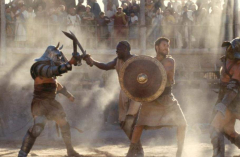 The empire rapidly broke apart. Lucious Verus died of plague. The Empire was devastated by the plague, probably smallpox which eventually claimed the life of Marcus Aurialis. Avidus Cassius revolted in Syria, Marcus’ daughter Lucilla,the same one who needed protection, married again and plotted to murder her brother Commodus. The plot was uncovered but from 184 onwards as Commodus slid towards insanity and megalomania, including appearing in the arena as a gladiator. There were stirrings of revolt in Britain and Gaul. Commodus was assassinated in 192.
The empire rapidly broke apart. Lucious Verus died of plague. The Empire was devastated by the plague, probably smallpox which eventually claimed the life of Marcus Aurialis. Avidus Cassius revolted in Syria, Marcus’ daughter Lucilla,the same one who needed protection, married again and plotted to murder her brother Commodus. The plot was uncovered but from 184 onwards as Commodus slid towards insanity and megalomania, including appearing in the arena as a gladiator. There were stirrings of revolt in Britain and Gaul. Commodus was assassinated in 192.
Competing claims
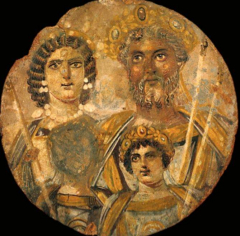 At the end of Commodius’ reign, in the year of the five emperors, armies in different parts of the empire voted for different candidates. Pertinax, involved in the coup which removed Commodus, lost support of the army, Didius Julianus could not obtain the support of the senate. Pescinnius niger won support in in the east (Syria) Clodius Albinus in the west (Britain, Gaul and Hispania and Septimus Severus in the Balkans (Pannonia and Illyria)
At the end of Commodius’ reign, in the year of the five emperors, armies in different parts of the empire voted for different candidates. Pertinax, involved in the coup which removed Commodus, lost support of the army, Didius Julianus could not obtain the support of the senate. Pescinnius niger won support in in the east (Syria) Clodius Albinus in the west (Britain, Gaul and Hispania and Septimus Severus in the Balkans (Pannonia and Illyria)
Albinus
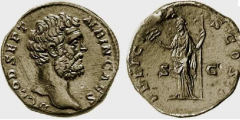 Albinus initially supported Septimus Severus as Augustus and accepted the title Caesar from him.
Albinus initially supported Septimus Severus as Augustus and accepted the title Caesar from him.
Albinus effectively ruled Britain, Gaul and Hispania as a seperate empire for four years. . He used the existing Celtic infrastructure which had been developing under the previous emperors. There is no record of Albinus in any of the listings of Roman emperors. The title of Caesar ( as opposed to Augustus) was invented for Albinus and apparently the senate did approve the appointment but not as Emperor.
Septimus Severus, the winner of the eastern battles thought Albinus was about to declare complete independance. Septimus brought his army , mainly Illyrians, Moesians and Dacians to do battle with Albinus whose army was composed of Britains, Gauls and Hispanic troops. Albinus gallic empire was a reality , though a short lived reality.
Bassinius
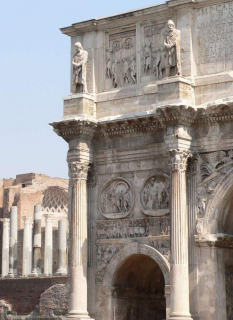 Thus the empire was again divided, on cultural ethnic and geographical lines. The year was AD 193, and from this point on the Celts craved total independance and in the future would always consider governance from Rome as unnaceptable.In the short term Septimus knew that he had to prove himself to the Gauls and after a further period in the east he conduced a significant campain in northern Britain where he died and his son Caracella continued the campaign before returning to Rome. Caracella was a nickname derived from the fact that he habitually wore a gallic cloak. his name was actually Lucius Septimus Bassianus. Geoffrey of Monmouth has a Bassianus as king of the Britons and stipulates that this king is synonymous with Caracella. If so Caracella did little to earn the title.
Thus the empire was again divided, on cultural ethnic and geographical lines. The year was AD 193, and from this point on the Celts craved total independance and in the future would always consider governance from Rome as unnaceptable.In the short term Septimus knew that he had to prove himself to the Gauls and after a further period in the east he conduced a significant campain in northern Britain where he died and his son Caracella continued the campaign before returning to Rome. Caracella was a nickname derived from the fact that he habitually wore a gallic cloak. his name was actually Lucius Septimus Bassianus. Geoffrey of Monmouth has a Bassianus as king of the Britons and stipulates that this king is synonymous with Caracella. If so Caracella did little to earn the title.
